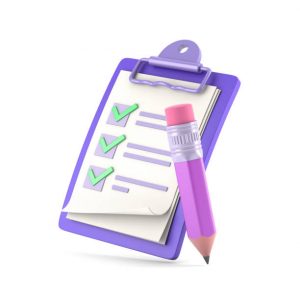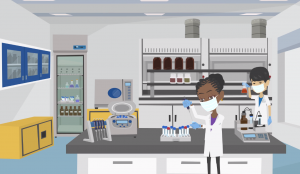Research Compliance Quarterly Fall 2022
- Welcome from RCS Director
- Overview of RCS service areas
- IBC and COB
- IACUC and CCM
- SCRO
- EH&S
- HSPP/IRB
- FCOI
- Export Control
- Research Security
- RCR
- Research Compliance in the News
Welcome to the first issue of our Research Compliance Quarterly from Research Compliance Services (RCS)!
 There have been a lot of changes happening in RCS recently and we are excited to share them with you! As the OVPR works to streamline the services our office provides across both UConn and UConn Health, we hope to utilize this quarterly newsletter to connect with our stakeholders and provide information on research compliance topics. Ultimately, our goal is to advance the mission of RCS: to promote a culture of ethics, integrity, and compliance with applicable laws, regulations, and policies governing research. The Research Compliance Quarterly will share helpful resources and guidance, updates on policy, spotlights on various areas of compliance, and more. You will find it is organized to reflect the emerging structure in RCS: “Animal Research & Safety,” “Human Subjects Research & Conflicts of Interest,” and “Research Security.” We hope you will find this newsletter to be engaging and informative, and as always, we look forward to assisting you with all your compliance needs.
There have been a lot of changes happening in RCS recently and we are excited to share them with you! As the OVPR works to streamline the services our office provides across both UConn and UConn Health, we hope to utilize this quarterly newsletter to connect with our stakeholders and provide information on research compliance topics. Ultimately, our goal is to advance the mission of RCS: to promote a culture of ethics, integrity, and compliance with applicable laws, regulations, and policies governing research. The Research Compliance Quarterly will share helpful resources and guidance, updates on policy, spotlights on various areas of compliance, and more. You will find it is organized to reflect the emerging structure in RCS: “Animal Research & Safety,” “Human Subjects Research & Conflicts of Interest,” and “Research Security.” We hope you will find this newsletter to be engaging and informative, and as always, we look forward to assisting you with all your compliance needs.
Sincerely,
Karen Moré, MS, CPIA
Director of Research Compliance, Animal Research and Safety
Do you work in a lab? The role of the UConn Health Biosafety Program is to protect laboratory workers, the public, and the environment from potentially hazardous biological agents. There are two committees within the Biosafety Program: the Committee on Biohazards (COB) and the Institutional Biosafety Committee (IBC). The COB reviews research that involves potentially hazardous biological materials and/or biological toxins. The IBC is responsible for reviewing research conducted with recombinant or synthetic nucleic acids. Both committees are comprised of UConn Health researchers and staff, and the IBC has two additional community members. In developing its guidelines, the IBC ensures that all policies and procedures are in accordance with both the regulatory frameworks governing the use of biological materials and the best practices adopted nationally.
What’s new in the IBC? We are currently preparing to launch the biennial registration of biological agents/materials to all principal investigators engaging in research on the UConn Health campus via a REDCap survey sent to your email.

Please visit our website at https://ovpr.uchc.edu/services/rics/ehs/biosafety/ for more information on our biosafety program.
For a link to Initial Lab Safety training: https://ovpr.uchc.edu/services/rics/ehs/safety-training-sessions/
To contact us, please email IBC@uchc.edu or IBC Coordinator, Victoria Scranton.
Working with animals? Animals have been central to the advancement of knowledge that has led to a vast array of benefits to both human and animal health. UConn Health regards the use of animals in research, teaching, and testing to be an integral component of continued progress in science, education, and agriculture. The UConn Health Institutional Animal Care and Use Committee (IACUC) is committed to the humane care and use of laboratory animals and has oversight of all animal-related activities performed at UConn Health. The animal care and use program refers to all the components that exist in support of the UConn Health’s activities involving live animals. These components include facilities, employees, researchers, policies and procedures, equipment and animals. Our responsibility is to ensure that all work performed with research laboratory animals complies with all applicable federal, state, and institutional laws, policies, and guidelines.
 What’s new with the IACUC? After more than 20 years of serving as the IACUC Chair, Dr. Joseph Lorenzo is retiring. As of January 1, we will welcome our new Chair, Dr. Stephen Crocker.
What’s new with the IACUC? After more than 20 years of serving as the IACUC Chair, Dr. Joseph Lorenzo is retiring. As of January 1, we will welcome our new Chair, Dr. Stephen Crocker.
Questions about animal-related activities? Contact IACUC Administrator, Alison Pohl.
The Center of Comparative Medicine (CCM) is the central provider of laboratory animal care and husbandry services within the UConn Health’s AAALAC-accredited animal care program. We are committed to programs of excellence in veterinary care and laboratory animal management practices for all species used at UConn Health in accordance with applicable laws and regulations. The CCM serves over 120 researchers encompassing over eight departments such as Immunology, Neuroscience, Cell Biology, Genetics and Genome Sciences, Surgery, etc. with a focus on the following sections: Biosecurity, Education, Quality Assurance, Husbandry and Operations, and Veterinary Services. A variety of research-related support systems are available within the sterile environment of the vivarium, including a small animal imaging facility with whole-animal luminescence, behavioral suite, and irradiator. To learn more about the professional services provided by CCM, such as animal procurement, drug ordering, per diem rates and training resources, please visit https://comparativemedicine.uchc.edu.
The Center for Mouse Genome Modification (CMGM) is a shared resource facility designed to produce genetically engineered mice for research projects of investigators, as well as rederivation services, sperm cryopreservation services, cryo-recovery service for frozen embryos and mouse breeding advice (https://health.uconn.edu/mouse-genome-modification/).

What’s new with CCM? The tri-annual Association for Assessment and Accreditation of Laboratory Animal Care (AAALAC) International site visit is around the corner! They will be visiting our facility during the winter term of 2023! More information will be on the way about how to prepare the facility/lab and record keeping requirements!
Ramaswamy M. Chidambaram, DVM, MSc, PhD, DACLAM, Director and Attending Veterinarian
Kelly Hoyt, BS, CMAR, Assistant Director of Operations
Lisa Chuba/Shaelyn Killoh, Lab Animal Services Specialists: Clinical Care, Training & Import-Export Services

Working with human stem cells? The role of the Stem Cell Research Oversight (SCRO) Committee is to ensure that human embryonic stem cell (hESC) and certain types of human induced pluripotent stem cell (hiPSC) research at both UConn Health and UConn campuses is well-justified, and that inappropriate and/or unethical research is not conducted. Our mandate is to ensure compliance with regulations related to federal funding restrictions and the state of Connecticut stem cell research statute, as well as ever-evolving national and international guidelines set forth by the National Academy of Sciences and the International Society for Stem Cell Research.
What’s new with the SCRO? The SCRO Committee is developing a new policy for neural/brain organoid research. Stay tuned! And please do not hesitate to reach out with any questions about your human stem cell research.
Audrey Chapman, Ph.D., SCRO Committee Chair
Ellen Ciesielski, SCRO Coordinator
At UConn Health, Environmental Health and Safety (EH&S) is dedicated to the health, safety and welfare of our research, medical, dental and support communities in the fields of environmental safety, biological safety, chemical safety and radiation safety. Through a combination of training, consultation, control, and inspection, EH&S works to protect the health and safety of all personnel in the course of UConn Health sanctioned activities and maintain regulatory readiness as it pertains to OSHA, NRC, EPA, DEEP, DOT, etc. We have targeted programs to ensure compliance and safety is a daily expectation. Our directive includes but is not limited to: fostering a safety culture, compliance alignment strategies strengthened by audits, providing comprehensive trainings in a variety of disciplines, risk reduction techniques, environmental stewardship, workplace evaluations, proper waste disposal oversight, injury and accident mitigation efforts. Our dedicated team of highly-skilled specialists is uniquely positioned to provide comprehensive EH&S services in support of UConn Health’s mission of excellence in research, teaching, service, and community outreach. Our website https://ovpr.uchc.edu/services/rics/ehs/ provides a comprehensive overview of the broad range of services we offer.
 If you have any questions or require our services, please feel free to call 860.679.2723.
If you have any questions or require our services, please feel free to call 860.679.2723.
What’s new with EH&S? During recent laboratory safety audits, we identified deficiencies regarding basic laboratory safety practices, many of which could be attributed to the extended period of time since an individual’s initial laboratory safety training as well as the simple fact that regulations have changed. To address this gap, EH&S will be launching a new “Laboratory Safety Refresher Training” in early 2023.
Steve Jacobs, EH&S Director
Working with human subjects? Human subject research is an activity that meets either the Department of Health and Human Services (DHHS) definitions of research and human subject or the U.S. Food and Drug Administration (FDA) definitions of clinical investigation and human subject. UConn Health Human Subjects Protection Program (HSPP) and the Institutional Review Board (IRB) oversee research (biomedical and/or social and behavioral) involving human subjects when UConn Health is engaged in the research activity. UConn Health holds a Federalwide Assurance (FWA) which is an agreement between this institution and the government, specifically the Office for Human Research Protections within the Department of Health and Human Services. The FWA assures that whenever UConn Health engages in non-exempt human subjects research conducted or supported by any federal department or agency that has adopted the Common Rule, UConn Health will comply with the terms of the assurance. While the assurance is applicable to federally funded research, UConn Health applies equivalent protection standards to all human subject research, regardless of the funding source.
The mission of the HSPP is to ensure that the rights and welfare of those who participate in research studies are protected. This mission is carried out through the functioning and effective oversight of the HSPP Scientific Review Committee, Institutional Review Boards and Regulatory Specialists, Research Compliance Monitor, Education and Development Specialist, and research personnel; and through effective communication with related departments and committees. These functions ensure that studies are being conducted in accordance with the ethical principles of autonomy, beneficence and justice (the Belmont Report), and in compliance with internal policies and applicable Federal regulation.
What’s new with the HSPP? Check out our quarterly HSPP newsletter for the latest updates!
- Dr. Richard Simon, HSPP Director, 860-679-3534, simon@uchc.edu
- Ms. Julia Blair, Interim Administrative Manager, 860-679-7555, jblair@uchc.edu
- Ms. Patricia Gneiting, Regulatory Specialist Panel 2, 860-679-4849, gneiting@uchc.edu
- Mr. Stephen MacKinnon, Regulatory Specialist, Panel 1, 860-679-8729, mackinnon@uchc.edu
- Mrs. Mayra Cagganello, Education Specialist, 860-679-8802, cagganello@uchc.edu
- Dr. Upendra Hegde, IRB Co-Chair Panel 2, 860-679-4249, uhegde@uchc.edu
- Dr. Julian Ford, IRB Chair Panel 1 & 2, 860-679-8778, jford@uchc.edu
- Dr. Julie Wagner, Chair, Scientific Review Committee, 860-679-4508, juwagner@uchc.edu
The Financial Conflict of Interest in Research program supports the UConn Health research community with understanding and complying with University requirements related to financial conflicts of interest (FCOIs) in research.
Who is an Investigator? Investigator means the project director or Principal Investigator (PI) and any other person, regardless of title or position, who is responsible for the design, conduct, or reporting of research (regardless of sponsor or funding source), which may include, for example, collaborators or consultants.
What are my responsibilities as a UConn Health investigator?
- Review and be knowledgeable of the UConn Health policy on financial conflicts of interest in research.pdf, including the definition of Significant Financial Interest (SFI) and how it applies to you.
- Promptly and fully disclose all SFIs, including those of a spouse and/or dependent child, that reasonably relate to your institutional responsibilities; and, if applicable, comply with FCOI management or mitigation plans.
- Submit a financial disclosure in the UConn Health InfoEd Financial Interests [FCOI] system: https://uchealth.infoed.uconn.edu/WebPortal/Main.asp?Mode=COIUserSearch.
- Annually
- Within 30 days of acquiring or discovering a new SFI
- Investigators on PHS awards or other sponsored projects requiring adherence to PHS FCOI regulations: Within 30 days of any applicable reimbursed or sponsored travel
- Understand that completion and submission of the financial disclosure form also satisfies the FCOI training requirement, as required under federal regulations and UConn Health policy.
- Investigators, coordinators, and persons obtaining consent must also disclose any project-specific SFIs pursuant to UConn Health Human Subject Protection Program (HSPP) policies.
What other resources are available to help investigators?
- Contact our team members by visiting the FCOI contacts page or e-mailing the FCOI mailbox: fcoi@uchc.edu
- Review step-by-step instructions on how to submit an electronic financial disclosure: How-to Guides and Materials
- For Faculty, Staff, and Students who are affiliated with a Company, review the guideline document.pdf
What are Export Control and Sanctions? In a university environment, faculty and students are free to engage in research in an open academic setting, and academic publications as well as the sharing of new knowledge are expected. At the same time, UConn works with multiple companies and sponsors, including both U.S. government and private entities, on research and development. Each sponsor has a unique process for safeguarding export-controlled technology, data, information, and tangible materials. As such, there is a delicate balance between ensuring the freedom to pursue research and scientific inquiries and complying with all applicable U.S. Export Regulations.
The International Traffic in Arms Regulations (ITAR) administered by the Department of State is a United States regulatory regime to restrict and control the export of defense and military related technologies to safeguard U.S. national security and further U.S. foreign policy objectives. The Export Administration Regulations (EAR) administered by the Department of Commerce regulates export and export restrictions: whether a person may export something from the U.S.; re-export something from a foreign country; or transfer something from one person to another in a foreign country. The EAR apply to physical objects – sometimes referred to as “commodities” – as well as intellectual property such as technology and software. The Office of Foreign Assets Control (OFAC) administers and enforces economic and trade sanctions in support of U.S. national security and foreign policy objectives. The ITAR, EAR and OFAC regulations work together to implement and enforce the U.S. sanctions and export control regime.
Failure to comply with these regulations can result in significant civil and criminal penalties. Monetary damages can exceed $1 million dollars. Criminal penalties, including jail time (up to 10 years) for individual researchers. For individual institutions, failing to comply with sanctions and export control regulations can mean the loss of federal funding. In addition, the damage to institutional reputation can cause a long-lasting negative impact.
Export and Deemed Export You may be saying to yourself “Well, even though I do sponsored research that may be considered sensitive, I don’t travel outside of the United States. So I should be good right?” The answer is it depends, and it would be helpful to learn more about the concepts of “export” and “deemed export.” Export is defined as the actual shipment or transmission of items subject to the EAR or ITAR out of the United States. The EAR is similar to the ITAR in that it covers intangible exports of “technology,” including source code, as well as physical exports of items. If an item is export controlled, the shipment of this item, or transfer of certain information, software, and technology related to this item outside the US may be prohibited for foreign policy or national security reasons (for example, a UConn professor hand-carrying her export-controlled microscope when she travels to China). Deemed export is the release of technology to a foreign national in the United States, which is “deemed” to be an export per the regulations, even though the release took place within the United States. Deemed exports may occur through such means as a demonstration, trade show, conference, oral briefing, or plant visit, as well as the electronic transmission of non-public data.
Foreign Nationals So then, what is a “foreign national?” In the export control regulations, a foreign national is an individual who is present in the US on a temporary immigration visa, e.g., F1 (student), H1B (Specialty Occupations) or J (exchange visitor) visa. In contrast, a U.S. person is any one of the following: U.S. citizen; lawful permanent resident (green card holder); or protected person (political asylum holder). As you can imagine, the risk of deemed export at a university can be relatively high because our community is comprised of domestic and international students, researchers, visiting scholars, etc.
Deemed exports can occur when export controlled information and technology are shared with foreign nationals in any of these situations:
- Students, postdocs, faculty, visiting scientists or training fellows
- Sharing export-controlled information with a foreign national on campus during conversations in student union, research presentations, visits to UConn labs, etc.
Research & Travel Research and travel are integral at any university. Researchers and students planning overseas trips for academic or research purposes should be mindful that there are sanctions and export control requirements for certain embargoed countries. OFAC regulations restrict travel to embargoed or comprehensively sanctioned countries such as Cuba, Iran, Syria, North Korea, and the Crimea region of Ukraine, the so-called Donetsk People’s Republic and Luhansk People’s Republic regions of Ukraine, even for academic/research purposes. Researchers with sensitive sponsored research must always check with OVPR Export Control or OVPR Facilities Security Officer before an overseas trip. ALL faculty, students, staff and admin MUST obtain written approval from UConn’s OVPR Export Control Office BEFORE organizing any travel to these countries. As mentioned previously, the export of university-owned equipment may require a license to take out of the US, including research equipment, laptops, cellphones, telescopes, chemicals, etc. This requirement may also apply to technology and technical data residing on laptops and other devices individuals intend to take with them overseas. To be sure, check with OVPR Export Control beforehand.
Last but not least, laboratory samples, substances, biological, genetic and other similar materials, which may need to be shipped overseas for research collaboration purposes, will require a Material Transfer Agreement (MTA) to be completed and reviewed by OVPR Export Control, before they can be sent off.
Do not hesitate to contact OVPR Export Control at exportcontrol@uconn.edu if you have any questions. The Office is always eager and ready to assist!
Research Security
What is Academic Solicitation? Academic Solicitation is the use of students, professors, scientists, or researchers as collectors improperly attempting to obtain sensitive information. Placing academics at, and requesting to collaborate with, U.S. research institutions under the guise of legitimate research in order to access developing technologies and cutting-edge research. These attempts can include requests for, or arrangement of, peer or scientific board reviews of academic papers or presentations; requests to study or consult with faculty members; and requests for and access to software and dual-use technology. Academic solicitation can also occur when a faculty member, student, employee, or visiting scholar seeks access to this same information. The number of foreign academics requesting to work with classified programs continues to rise, and the academic community will likely remain a top target for the foreseeable future. Although most academic contacts are likely legitimate, some foreign academics may ultimately take advantage of their placement and access to further their country’s research and development goals.
Who is being targeted?
- Researchers, scientists, and subject matter experts conducting research/projects on behalf of a U.S. Government customer
- Researchers, scientists, and subject matter experts employed at academic institutions or with published in scientific or technical journals or presented at conferences

- Students, professors, and researchers with access to research and technical information (especially graduate and post-doctorate students)
- Researchers, scientists, and subject matter experts working on cutting-edge technology
- Subject matter experts teaching technical courses
What to report? Any contact (i.e., emails, telephone, personal contact) that is suspicious because of the manner or subject matter of the request. This may include requests from U.S. persons or from foreign nationals located in the United States or abroad, and may consist of:
- Unsolicited applications or requests for undergraduate, graduate, postgraduate, or other research positions
- Unsolicited requests for access to research papers or other research-related publications or documents
- Unsolicited requests for assistance with or review of thesis papers, draft publications, or other research related documents
- Unsolicited invitations to attend and/or present at international conferences
- Unsolicited grants or gifting of funds/equipment to conduct joint research projects from foreign academic institutions or foreign governments
Contact the UConn Research Security Office at fso@uconn.edu. You can also file an anonymous report at compliance.uconn.edu.
2023 Responsible Conduct of Research (RCR) Training Sessions
The Office of the Vice President for Research (OVPR) offers a series of Responsible Conduct of Research (RCR) Training sessions designed to meet the requirement for instruction in the responsible conduct of research. These sessions will occur throughout the month of February 2023 and will be presented live via WebEx in a series of 1-hour long unique sessions. Please note that attendance of 8 hours of unique presentation material is required in order to satisfy the RCR training requirement. The schedule of events is being developed and will be posted soon; please visit the RCR website for more information and a list of sessions with their corresponding sign-up times: https://ovpr.uconn.edu/services/rics/responsible-conduct-of-research/. There is no cost to register and participate.
The National Institutes of Health (NIH) defines Responsible Conduct of Research as the practice of scientific investigation with integrity. Training in RCR helps prepare investigators to conduct their research activities ethically by teaching on topics such as authorship, collaborations, conflicts of interest, human and animal subjects, mentoring, and research misconduct. The National Science Foundation (NSF) requires in-person RCR training for all undergraduates, graduates, and post-doctoral fellows who conduct research supported by NSF funds. Similarly, NIH requires that all trainees, fellows, participants, and scholars receiving support through any NIH training, career development award (individual or institutional), research education grant, and dissertation research grant must receive instruction in responsible conduct of research. The National Institute of Food and Agriculture (NIFA) also requires education in RCR for program directors, faculty, undergraduate students, graduate students, postdoctoral researchers and any staff participating in research projects supported by a NIFA award.
Research Compliance in the News
- Student Infected With Debilitating Virus in Undisclosed Biolab Accident –The Intercept, November 1, 2022
- China-US Climate Collaboration Ended Due to Security Concerns – The Scientist, April 12, 2022
- A Jury Finds a Kansas Scholar Guilty of Fraud and Hiding Ties to China – NPR, April 7, 2022
- Amid the Terror of War, Efforts to Keep Science Alive in Ukraine – The Scientist, March 28, 2022
- Universities Must Reject Fossil Fuel Cash for Climate Research, Say Academics – The Guardian, March 21, 2022
- Oust the Mouse: A Plan to Reduce Mammal Use in Drug Development – The Scientist, March 15, 2022
- UK Universities Brace for Impact of Sanctions Against Russia – The Guardian, March 4, 2022
- CRISPR Patent Ruling Favors Broad Institute – The Scientist, March 1, 2022
- The NIH is ‘Largely Finished’ Moving its Former Research Chimps to a Sanctuary – NPR, January 27, 2022
Research Compliance Services
L Building, 5th floor
UConn Health
263 Farmington Avenue
Farmington, CT 06030
https://ovpr.uchc.edu/services/rics/
Research Compliance Services is part of the Office of the Vice President for Research.
